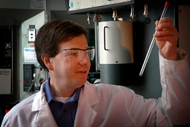- Number 285 |
- April 27, 2009
Small interactions pave way to big solutions

Dan Ginosar
America is searching for a way to feed its jets and cars without relying so heavily on foreign oil or emitting so many greenhouse gases. Dan Ginosar, a chemical engineer at DOE's Idaho National Laboratory is one of many working on a solution.
As technical lead for the lab's interfacial chemistry group, Ginosar is helping develop transportation fuels with a lower carbon footprint. The group has found hope in – among other areas – greasy wastewater.
His team developed an alternative biodiesel fuel process that converts low-grade vegetable oils and fats into a diesel product. Published studies have rated biodiesel made from waste oils as having the lowest carbon footprint of any fuel available today, Ginosar said.
"The biodiesel process just reacts methanol with vegetable oil and it breaks the vegetable oil down into little chunks that are the same chemical size as diesel oil," he said.
Ginosar's work focuses on the interactions that occur at the surfaces where liquids meet solids. His group developed a process that uses a special catalyst and solvent to keep everything soluble and speed the conversion reaction.
The team licensed five of its inventions to a company called BioFuelBox, which is now building the first biodiesel plant to use the technology. Based in American Falls — the heart of Idaho potato country — the plant will rely on wastewater riddled with the frying grease from potato processing plants.
This project and others led in 2008 to two patents, three pending patents and two research agreements worth millions of dollars, all of which earned Ginosar the distinction "Inventor of the Year."
His 15 years at INL started while he was completing his doctorate in chemical engineering from the University of Kansas. In his spare time, Ginosar enjoys hiking and biking in Yellowstone and Grand Teton national parks near Idaho Falls.
Submitted by DOE's Idaho National Laboratory
